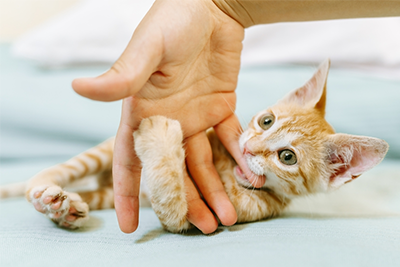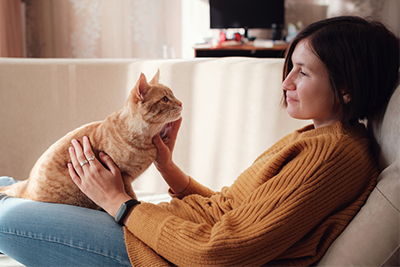How to Care for Your Cat When They’re Losing Baby Teeth
By Rexvet

Did you know that cats also have baby teeth, just like humans? Yes, kittens grow teeth as babies and at certain times, those teeth fall out and new permanent teeth come in.
Cats also lose baby teeth and this is a completely normal process. Usually, their milk teeth erupt a few weeks after birth. However, there are some changes in their behavior, which you need to understand.
In this blog, we will take a detailed look at when they’re losing baby teeth, what are the symptoms, how you can provide comfort and when it is necessary to take them to the veterinarian.
When your cat is losing baby teeth, they may also experience many physical problems. At such times, you can treat your cat or any pet from the comfort of your home through RexVet. We provide you with fast, easy and reliable service. Our licensed vets are available 24/7 to treat your pet and if necessary, they will also give you a prescription. And from our own pharmacy, you can get the medicine according to that prescription at your home.

Do Cats Really Lose Baby Teeth?
Kittens also lose baby teeth like humans. They start to grow their little milk teeth in the first two to three weeks after birth. There are about 26 baby teeth and these usually start to fall out between 3 and 4 months. Then, 30 permanent teeth gradually grow in, which remain for the rest of their lives.
During this time, you may notice that the kitten is biting toys or your hand more, is a little uncomfortable while eating food, or suddenly sees a small tooth lying on the floor. These are actually normal signs of a cat losing baby teeth.
However, remember that the timeline for changing teeth may not be exactly the same for every cat. Some may lose their teeth a little earlier, while others may be later. You do not need to worry about this, as long as there are no unusual symptoms.
Understanding Kitten Dental Development
The process of teething and replacement in kittens is called kitten dental development. Just like human babies, your kitten's teeth will grow and fall out at certain times. It's important to understand this stage, as your pet's care needs will be different during this time.
When do Kittens Start Teething?
Your kitten's first teeth usually start to appear about two weeks after birth. They will have almost all of their baby teeth by 3 to 4 weeks of age. They will then start to lose their teeth by around 3 months of age, and their new permanent teeth will be fully erupted by 6 months of age.
During this time, they will likely chew more on toys or furniture because their gums feel itchy and sore. So it's normal if your cat suddenly starts showing more "chewing behavior."
How Many Baby Teeth Do Cats Have?
A kitten has a total of 26 baby teeth. We call these "deciduous teeth." These include incisors, canines, and premolars.
While the permanent teeth are coming in, these baby teeth fall out and gradually they develop their 30 adult teeth—which they will keep for the rest of their lives.
If you notice that your cat is losing teeth but not new teeth, or that old and new teeth are appearing together in the same place, then it may be a problem. If you notice such a condition, you should not ignore it and take it to a veterinarian as soon as possible.
Signs Your Cat Is Losing Baby Teeth
It is completely normal for a kitten to lose baby teeth, but it is important for you to recognize the signs in time. This will help you understand whether everything is going well or if additional care is needed.
Physical Signs
There are several physical changes that can be clearly seen in a cat's body when baby teeth are falling out.
The signs are:
The gums appear red or slightly swollen
Small teeth may be left in the food bowl or on the floor
There may be a little blood when teething
All of these are part of the natural process. So don't panic at all if you see these signs.
Behavioral Changes
When teething, cats will try to bite almost anything to relieve discomfort. This is usually due to the presence of a dewclaw in their gums.
They will start chewing objects or toys more
They will want to bite hands or furniture
They may lose interest in food or want soft food
If you think your cat is not eating as much as before, it may be because of teething.
Is Teething Painful for Cats?
Yes, teething can be uncomfortable for cats, but it is not a long-lasting or unbearable pain. They may become a little irritable, sleep more, or show less interest in playing. During this time, you need to be patient and try to comfort them.
How to Comfort Your Cat During Teething
Your cat will need your support and a little extra care during this time of teething. They will feel uncomfortable during this time of teething, but you can help them feel more comfortable with a few simple steps.
Safe Chew Toys and Teething Aids
Your cat will want to chew on almost anything during this time. So using safe chew toys is the best solution for them. There are rubber toys specifically made for cats on the market, which help reduce teething pain and itchy gums. If you want, you can put a wet towel in the refrigerator and chill it as a toy—this will work as a natural teething relief.
Adjusting Diet and Soft Food Options
Cats may have difficulty eating hard foods during teething or growing. So if you want, you can offer them soft food or wet cat food. This will make it easier for them to eat and will also reduce discomfort. If you want to feed dry food, you can soak it in a little warm water to soften it. This will reduce the pressure on the teeth and increase their interest in eating.
Providing Extra Care and Attention
Your cat may be a little irritable or restless during this time. They will want to sleep more, and sometimes they will want extra attention. So spend more time with them, pet them, and play with them. The more care you show, the faster they will be able to get through this period comfortably.
Dental Care Tips for Growing Cats
After a kitten has all its baby teeth and they fall out, care for the permanent teeth. Ensuring they form the right habits helps maintain good dental health for a long time to come.
When to Start Brushing Your Cat’s Teeth
Generally, you can begin tooth brushing when the cat is around six months, and for kittens even less time is recommended. Brushing can be introduced gradually as a part of the routine by brushing with a little food or by softly brushing their teeth with a baby toothbrush. Regular brushing limits plaque and tartar development, thereby decreasing the chances of dental disease in the future.
Importance of Regular Vet Checkups
Your cat does need to visit the vet regularly. At least once a year, a dental examination should cover all other atypical health issues and dental health should cover all other atypical health issues. Tactful vet professionals may also keep the cat relaxed with pre-emptive dental care.
Preventing Dental Problems Early
A few simple habits that start early can prevent dental problems in the future to a large extent. For example:
Maintaining the right balance of soft and hard foods
Using chew toys or teeth cleaning toys
Continuing brushing and regular checkups
These small habits will keep your cat's teeth healthy in the long run and reduce discomfort.
When to See a Veterinarian
Keep in mind that most of the time, teething is normal in cats, but sometimes it can also be a sign of a problem. You should aim to know when to take your cat to the veterinarian immediately.
Some common situations where it is important to be careful:
If there is excessive bleeding or severe swelling of the gums during teething
Retained baby teeth after permanent teeth have erupted
The cat is uncomfortable eating or is avoiding food altogether
If hard or loose teeth, bad breath, or red, swollen gums are present
If such symptoms occur, you should consult a veterinarian without delay. A professional checkup may include dental cleanings, minor surgeries, or other dental treatments, which can make your cat comfortable and prevent major problems in the future.
Taking timely action can reduce dental problems and help your pet go through the process of teething healthily.

Why RexVet Is the Best Choice for Your Pet’s Health
You should never compromise on your pet’s health. Allergies, ringworm, respiratory problems, diarrhea—whatever the problem, RexVet provides fast, easy, and professional solutions. Our goal is not just to treat, but to make caring for your pet easy, affordable, and safe.
We are a non-profit organization, where we provide 24/7 service. With our own pharmacy, prescription medications are delivered directly to your home. In 2025, we were recognized as a Top Rated Online Veterinary Service in the USA. In addition, through us you can also take free health and nutrition courses—from beginner to advanced levels.
We have two convenient plans, so you can choose according to your needs. The Per Appointment Plan is just $35 per appointment, and the Family Plan—4 virtual appointments a year for just $10 a month, for a total cost of $120 per year. Free shipping on orders over $49. Plus, a portion of our proceeds goes to charity, which benefits even more pets.
Final Thoughts
Caring for a cat while it loses its baby teeth is easier when you know the teething process is completely normal. Looking for the physical signs, behavioral changes, and appropriate care helps you know that they are indeed undergoing a natural teething process. Routine brushing, safe chewing toys, and vet checkups contribute greatly. So, start taking small steps to keep your cat’s teeth healthy today. And book an appointment with our experienced vet for regular checkups in the comfort of your own home!